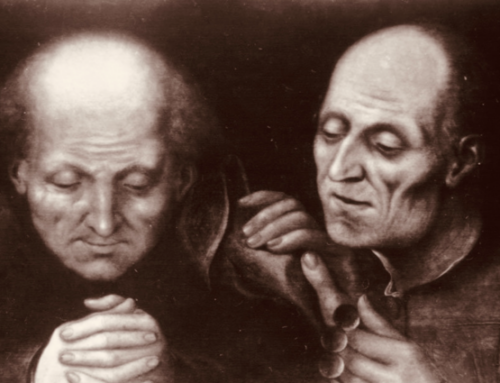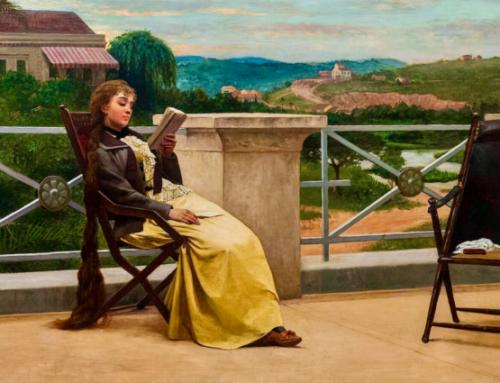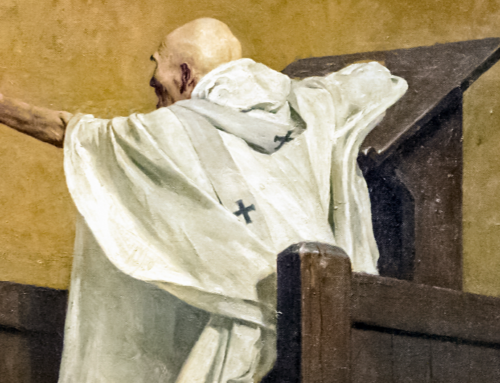“A Spiritual Aeneid” is Ronald Knox’s account, ingeniously constructed on the Virgillian frame, of his transition from Anglo-Catholicism to Roman Catholicism. It was written immediately after his reception and before his ordination as priest and is, by contrast with many similar confessions, remarkably unemotional and full of charity and justice towards the Church of his upbringing.
A Spiritual Aeneid, by Ronald Knox (270 pages, Cluny Media)
 Mgr. Ronald Knox died at the age of sixty-nine on August 24, 1957, at the house of Mrs. Raymond Asquith in the village of Mells where he had spent the last eleven years of his life. He was the most brilliant and versatile churchman of the English-speaking world and one of the most prolific.
Mgr. Ronald Knox died at the age of sixty-nine on August 24, 1957, at the house of Mrs. Raymond Asquith in the village of Mells where he had spent the last eleven years of his life. He was the most brilliant and versatile churchman of the English-speaking world and one of the most prolific.
His life falls easily into a series of well-marked stages. Twentytwo years of it in all, divided by eleven years absence, were spent at Oxford. He went up to Balliol in 1906 preceded by a reputation of unique lustre. While still at Eton he had written a book of light verses in English, Latin and Greek, and he is still remembered there as the cleverest boy who ever passed through that school which is famous not only for its ancient aristocratic connexions but for its ability to foster in the few who are fit to receive it, a culture of incomparable grace and subtlety. At Oxford all the coveted distinctions—the Hertford and Ireland scholarships, the presidency of the Union, a first in Greats—came to him as by-products of an exuberant intellectual and social life led in the heart of that historic, quintessential, tragic Oxford band who were soon to fall in battle; that golden roll of honour whose fame still rings clear above the whisper of envy and the thunder of subsequent national disasters. ln 1910 there seemed no limit to the prizes, political, academic or literary, which a smiling world held out to him. But his career had long been decided. Always devout and scrupulous, the son and grandson of Anglican bishops, he chose the Church of England, was elected chaplain of Trinity and for four years, before the realities of war took the spice out of that kind of daring, he was the enfant terrible of the extreme Anglo-Catholic party. To this brief season belong the most exquisitely contrived of his satiric and polemic writings. He was never to resume (or seek) the gay panache of “Absolute and Abitophel” and “Reunion All Round.”
In 1915 he left Oxford. In 1917 he was received into the Roman Catholic Church and, when his war-work as cryptographer was finished, retired to St. Edmund’s College, Ware, a centre of theological orthodoxy very different from Balliol and Trinity, where he made his headquarters until 1926, when he returned to Oxford as Catholic chaplain to the University. In 1939 he removed to Shropshire to devote himself to his translation of the Vulgate. In 1946 he settled at Mells.
He was a priest for forty years. It was at the altar and in his private prayer that his full life was led, to which all his other achievements were adventitious decorations. We cannot seek to observe him in the supernatural world that was his true milieu but must be content to snatch a likeness of him in that relatively insignificant life that was lived in the eye of his fellow men.
In him the Roman Church had found her most notable English convert since Newman. What use did she make of him? The question is pertinent, for Ronald Knox was very ready to be used. He liked the classic division of mankind into the “drastic”—the men of action and decision who know what they want and how to gee it, who have little patience with the hesitation of others, who never shrink from “making a scene”—and the “pathetic” who take what is on the table when it is offered them, who suffer neglect rather than assert their rights, who hate to inconvenience anyone.
 In this sense he was eminently pathetic. Most of his books were written at another’s suggestion—more often a publisher’s than an ecclesiastical superior’s; were tasks set him which he transformed by his genius from drudgery to art. Of only one work, Enthusiasm (1950), did he claim that it was done wholly for the love of the doing. It was, he said, “almost without exaggeration the whole of his literary life, the unique child of his thought.” For better or worse he had very little direction from above. The organisation of the Roman Church is more easy-going than strangers suppose. Having entered it, he was left to make his own soul and find his own occupations. After his reception he took small part in controversy. Those who thought that a dexterous new swordsman had been recruited were disappointed. The strain preceding his own momentous decision had left him weary but confident, so sure of his case that it bored him to repeat it while charity forbade the lampoons for which he had such rich natural equipment.
In this sense he was eminently pathetic. Most of his books were written at another’s suggestion—more often a publisher’s than an ecclesiastical superior’s; were tasks set him which he transformed by his genius from drudgery to art. Of only one work, Enthusiasm (1950), did he claim that it was done wholly for the love of the doing. It was, he said, “almost without exaggeration the whole of his literary life, the unique child of his thought.” For better or worse he had very little direction from above. The organisation of the Roman Church is more easy-going than strangers suppose. Having entered it, he was left to make his own soul and find his own occupations. After his reception he took small part in controversy. Those who thought that a dexterous new swordsman had been recruited were disappointed. The strain preceding his own momentous decision had left him weary but confident, so sure of his case that it bored him to repeat it while charity forbade the lampoons for which he had such rich natural equipment.
After Caliban in Grub Street (1930) and Broadcast Minds (1932), in which he dealt with opponents who were mostly unworthy of his attention, he decided that his vocation was not to discomfit the infidel but to work among the clergy and laity of his own Church to fortify and refine their devotion and remind them of their high calling. He drew apart from secular life with the result that the name of one of the very few prose stylists of his age was seldom mentioned in literary journals.
Three books, certainly, Enthusiasm, Let Dons Delight and God and the Atom claim a place in the library, however small, of anyone, however indifferent to religion, who recognises distinction in literature, but it is by his Bible that he wished to be remembered. It took ten years of his life at the height of his powers. In his Romanes Lecture and On Englishing the Bible[*] he specified the ideals which he so fully illustrated. His task was to translate a translation, to English St. Jerome’s Latin; to enter the mind of a fourth-century Dalmatian ascetic and determine what the original Hebrew and Greek texts had meant to him, and to convey that meaning in the language of the twentieth century.
Those who are inescapably bound to the diction and cadences of the Authorised Version may deplore the lack of quaintness in his lucid text, but Bible-reading in this age is not the daily occupation it once was. When we are given a Bible “designed to be read as literature” we have a book like Sir Thomas Browne’s Urne Burial to be read once or twice in a lifetime. Those who still regularly study what they believe to be the word of God, find the Knox version a source of unfailing light.
In appearance Ronald Knox was unmistakably clerical. His tastes and habits were firmly set in his age, class and nationality, but enlivened by many endearing foibles. He read few modern novels and no modern poetry. In his later years, outside his subjects of study, he restricted himself to bedside books with a strong preference for P. G. Wodehouse and Agatha Christie.
He was methodical and very industrious with a liking for recreation rather than leisure—excelling in games which require verbal ingenuity. No obvious ascetic, with a keen enjoyment of tobacco, wine and food, he nevertheless unobtrusively subjected himself to discomforts which many men, younger and poorer than he, would shun.
He was reserved, hospitable, punctilious, rather shy before strangers, most at his ease in familiar country houses, university common-rooms and among the children of his friends.
A Spiritual Aeneid is his account, ingeniously constructed on the Virgillian frame, of his transition from Anglo-Catholicism to Roman Catholicism. It was written immediately after his reception and before his ordination as priest and is, by contrast with many similar confessions, remarkably unemotional and full of charity and justice towards the Church of his upbringing. It was not a book which in later years he liked—indeed he sometimes spoke of it in terms almost of disgust—but he agreed to its reissue in 1950 and wrote his own preface, “After 33 Years,” for that edition. That essay makes any further preface unnecessary except such as I have attempted here, to complete and amplify the biographical details.
In spite of many warm invitations Ronald Knox never went to America. He shrank not, as has sometimes been suggested, from American warmth but from the publicity which attends fame and from the physical strain of adapting himself to new habits of life. He travelled very little and was seldom happy abroad. Privacy and regularity of life were essential to his work and he had much work before him still, which was left unfinished at his untimely death. His exquisite courtesy was unfailing but it imposed a strain on him. He was incapable of snubbing the importunate or of delegating correspondence to a secretary so that to protect himself for his work, which was always paramount—prayer alone excepted—he avoided new acquaintances and new experiences during the last twenty-five years of his life. America never heard his voice—so delicate, precise and natural, but she has his writings. To these A Spiritual Aeneid makes an essential introduction.
[*]Published in the United States under the title Trials of a Translator.
This essay serves as the Foreword to A Spiritual Aeneid.
Republished with gracious permission from Cluny Media.
The Imaginative Conservative applies the principle of appreciation to the discussion of culture and politics—we approach dialogue with magnanimity rather than with mere civility. Will you help us remain a refreshing oasis in the increasingly contentious arena of modern discourse? Please consider donating now.
The featured image is “Lake Avernus- Aeneas and the Cumaean Sybil” (1814 or 1815) by Joseph Mallord William Turner, and is in the public domain, courtesy of Wikimedia Commons.







Ronald Knox also wrote mysteries and was a member of the Detection Club which included G.K. Chesterton, Agatha Christie, Dorothy Sayers, and Josephine Tey.